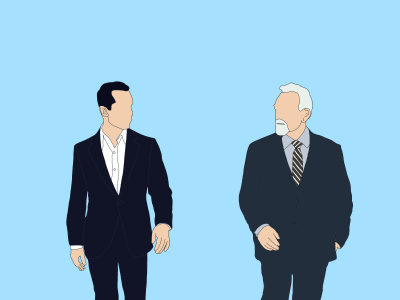I’ve never really believed the phrase “money can’t buy you happiness.” I thought it was naïve and foolish to undermine the financial security and overall contentment that money could bring. And to a certain point, I still believe that.
But after binge-watching the last season of HBO’s successful series “Succession,” I slowly understand where the phrase came from.
The show is a hit. My Twitter feed has been inundated with discussion on the latest episodes and opinions on the characters — a big problem when trying to avoid spoilers. But most of the debate revolves around the family drama and the much-anticipated response of who will be the successor to the family’s empire.

Those discussions failed to include how the show entertains an interesting argument: How a wealthy empire with a shiny façade dangerously balances on decaying foundations.
The show focuses on the New York elite explored through the Roy family – an ultra-wealthy family and owners of a media conglomerate Waystar Royco. Throughout the four seasons, the family is perpetually involved in drama as they fight for control of the company.
And the family is messed up. To say it’s dysfunctional would be an understatement. In the first season, we meet the four Roy kids: Kendall (Jeremy Strong), Siobhan (Sarah Snook), Roman (Kieran Culkin) and Connor (Alan Ruck).
They all grew up with an incredibly abusive father, Logan Roy (Brian Cox). Logan Roy is an influential figure and owner of a billion-dollar company. The character even appears to have a close connection to the president.
While Logan is a savvy — but controversial — business owner, he is also a bad father. The character extends his autocratic persona to his parental figure as he browbeats his kids into doing what he says.
He hits Roman when he has an outburst, emotionally manipulates them to make them do as he wishes and mocks them in public. Logan even worsened Kendall’s drug addiction by planting stories about his drug use. And he never appears to feel remorse.
Though the kids are constantly kicked down, they still fight for their father’s attention. And the only way to do that is to make him money. When Logan shows any sign of affection, it’s usually the kid who indubitably follows his commands and contributes to his net worth.
It’s a sad dynamic. But for Logan, that’s what showing love looks like — toughening his kids to the world by demanding perfect success and forcing them to listen closely to his every word.
The kids that deviate from his wishes suffer greatly. Kendall, for instance, tries to stand up to his father. There was some hope that he was finally going to make it after pairing up with Logan’s nemesis and also billionaire Sandy.
But Kendall, who was also lost in drugs then, gets into a car crash and accidentally kills a waiter that was in the car with him. What is Logan’s response? Seeing his son’s evident distraught and guilt, he manipulates him into becoming his work puppet — the price Kendall paid to destroy evidence linking him to the accident.
It’s messed up.
Toxicity has also seeped into the sibling’s dynamics as they constantly look for ways to keep a leg up in the company’s CEO race and undermine their sibling’s position. Power, and the fight for it, seem to be the only thing holding the siblings together.
But that’s how they were raised—they grew up in an environment where business went before family, and now, as adults, they have maintained that mindset. It’s all they’ve ever known.
And the abusive cycle continues to expand beyond the small circle. We see Kendall retreating from his children’s life and intimidating people into doing as he wishes (a Logan tactic) and Siobhan ruining her marriage because she belittles her husband and is unable to commit to a monogamous relationship (another Logan mannerism as we see him with cheating on his wife two times).
It’s evident that while the show portrays the abundant life of the rich and powerful, and underscores the ingenuity of some characters, it also showcases a love-starved family and the sad price that they pay for their wealth.
So, does money buy happiness? It can give you education, housing, food and a nice trip. But it does not buy a loving family.














